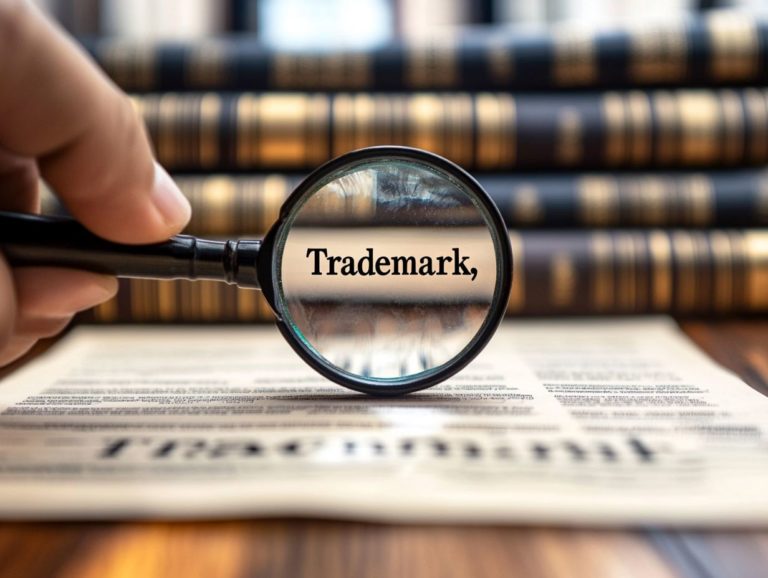What Are the Consequences of IP Theft?
Intellectual Property (IP) is the backbone of innovation and creativity. It covers everything from groundbreaking inventions to unique brand identities.
The rising incidence of IP theft is a serious threat to businesses and individuals alike.
This article explores various forms of IP theft, the legal and reputational consequences that follow, and effective prevention strategies.
We will also provide actionable steps to take if you become a victim of IP theft, empowering you to safeguard your valuable creations and maintain your competitive edge.
Contents
- Key Takeaways:
- Types of IP Theft
- Consequences of IP Theft
- Preventing IP Theft
- What to Do If Your IP is Stolen
- Frequently Asked Questions
- What are the legal repercussions of IP theft?
- How does IP theft hinder innovation and progress?
- Can individuals be held accountable for IP theft?
- How can we prevent IP theft?
Key Takeaways:

- IP theft can lead to serious legal penalties and fines.
- Businesses may face financial losses and damage to their reputation.
- To prevent IP theft, you must act now to protect your intellectual property!
Defining Intellectual Property (IP)
Intellectual Property (IP) refers to the legal rights that protect your creative efforts like inventions, literary works, designs, symbols, and brand names. It is an invaluable asset for businesses, offering a competitive advantage by safeguarding innovations from unauthorized use.
In today s digital world, where criminals are always looking for opportunities, understanding IP is vital. Vulnerabilities can lead to significant financial losses through IP theft, trade secret violations, and design infringements. Remain vigilant in enforcing non-disclosure agreements to protect your confidential information and strengthen your market position.
The different types of IP such as patents, copyrights, and trademarks play crucial roles in this protective framework. Patents reward you for your innovative technologies, copyrights safeguard your artistic expressions, and trademarks ensure that your brand identity stays protected.
With the increasing reliance on digital platforms, securing these rights is more important than ever. Legal protections deter breaches and encourage innovation, giving you the confidence to invest time and resources into your creations.
Actively managing and prioritizing your IP strategies is essential for sustained growth and long-term success.
Types of IP Theft
IP theft can manifest in many ways, and it s essential to understand how it impacts both businesses and individuals. From leaking trade secrets to stealing employee data, the consequences can be devastating.
Insider theft occurs when trusted employees misuse their access to confidential information. Corporate spying, where one business illegally gathers information about another, also poses a significant threat. Breaches in security systems can leave sensitive data exposed, inviting bad actors eager to exploit any weaknesses.
Understanding Various Types of IP Theft
IP theft takes various forms, including corporate spying, insider theft, and employee data theft. Each type presents unique challenges and potential financial repercussions for your organization.
Corporate spying can occur in many ways, from stealing proprietary product designs to intercepting trade communications, ultimately threatening your company s competitive advantage.
On the other hand, insider theft often involves employees using their positions to extract sensitive information for personal gain, undermining trust within the organization.
Employee data theft usually results from negligence or malicious intent during cyberattacks, leading to compromised confidential records and a significant loss of customer trust.
The consequences of these thefts can be severe, resulting not only in immediate financial losses from canceled contracts or product recalls but also long-term damage to your reputation and market position.
Consequences of IP Theft

IP theft isn’t just a minor issue; it can destroy your business. The impact can be severe, often leading to significant financial damage for the businesses involved. You might find yourself facing legal action, especially in cases of copyright and patent infringement. This can result in costly litigation and painful losses in market share.
Reputational harm can erode trust among your clients and partners. This erosion of trust can ultimately impact your competitive positioning in the market, making it imperative to safeguard your intellectual property diligently.
Legal Penalties and Fines
Legal penalties and fines tied to IP theft can be substantial, often racking up millions in financial damage for those on the wrong side of the law. Violating copyright or patent laws opens the door to severe consequences, including hefty fines, injunctions, and court-mandated changes to your business practices.
These legal repercussions are dictated by a complex web of legislation, such as the Copyright Act, the Patent Act, and the Lanham Act, each crafted to safeguard specific aspects of intellectual property.
Take, for instance, the high-stakes legal battles between companies like Apple and Samsung over patent infringement. These cases serve as a glaring reminder of the serious financial and reputational risks involved. In one high-profile instance, a jury awarded Apple over $1 billion in damages after finding that Samsung had willfully infringed on several of its patents. This outcome illustrates how diligently courts uphold these rights.
Moreover, research from the U.S. Chamber of Commerce highlights that IP theft costs the economy a staggering $600 billion annually, underscoring the critical need for rigorous compliance with these laws.
Damage to Business and Reputation
The repercussions of IP theft extend far beyond mere financial loss; they can severely tarnish your company’s reputation and diminish your competitive edge in the market. Understanding the risks of not protecting IP is crucial, as corporate espionage and insider theft can erode customer trust, leading to weakened business relationships and making recovery an uphill battle.
In today s digital landscape, where information travels at lightning speed and competition is cutthroat, the consequences of intellectual property theft can be particularly severe. Your business operations may face significant disruptions as resources are redirected to address security breaches and manage public relations crises.
You find yourself at a critical juncture, tasked not only with recovering lost assets but also with rebuilding trust among clients and stakeholders. To navigate these challenges effectively, consider implementing proactive measures such as:
- Establishing robust cybersecurity protocols,
- Educating employees on the importance of IP protection,
- Conducting regular audits of your systems for vulnerabilities.
Additionally, developing a comprehensive recovery strategy that emphasizes transparent communication and reputation management can significantly aid in reclaiming the loyalty of your customer base.
Preventing IP Theft
Preventing IP theft demands a comprehensive strategy that combines strong security measures, thorough employee training, and the implementation of non-disclosure agreements. You must remain vigilant in safeguarding your confidential information while establishing best practices that effectively deter malicious actors from exploiting any vulnerabilities.
By adopting this multifaceted approach, you can create a formidable barrier against potential threats to your intellectual property.
Take immediate steps to protect your business and intellectual property.
Protecting Your Creative Ideas and Inventions

Protecting your creative ideas and inventions begins with establishing strong corporate policies and implementing confidentiality agreements. These measures safeguard sensitive information from unauthorized access.
It’s crucial to regularly assess your security systems to effectively identify and mitigate potential breaches. This process involves not just training employees on data protection protocols, but also establishing robust security measures that include encryption, access controls, and secure servers.
Having strong legal agreements like licensing agreements and patents helps protect your interests in the event of disputes. Take these proactive steps to build a strong defense against IP theft!
Best Practices for Avoiding IP Theft
Implementing best practices to prevent IP theft is essential for safeguarding your creative ideas and inventions while minimizing the risks associated with security breaches.
Regular employee training on data protection and the use of confidentiality agreements can significantly lower the chances of insider threats. You should cultivate a culture of transparency and trust within your organization.
This can be achieved through engaging workshops and team activities that highlight the value of intellectual property. Along with training, it s imperative to adopt robust security measures such as encryption, secure access controls, and regular audits to further strengthen your defenses against unauthorized access.
Establishing clear legal frameworks, including comprehensive IP policies and reporting procedures, enables your employees to feel enabled in their responsibilities while providing a structured response plan in case of a breach. Collectively, these strategies create a layered approach to effectively combat IP theft.
What to Do If Your IP is Stolen
If your IP is stolen, you must report the theft and seek legal action against the perpetrators immediately to mitigate damage and explore legal avenues for recovery.
Reporting the theft to authorities and implementing damage control measures are essential steps in effectively addressing incidents of corporate espionage and other forms of IP theft.
Steps to Take and Legal Options
The first step you should take if your IP is stolen is to report the theft to the appropriate authorities. After that, consult legal experts to explore your available options.
Legal actions include filing injunctions or seeking financial compensation. It’s crucial to act swiftly in these situations; delays can complicate the recovery process significantly.
Documentation is key gathering evidence such as emails, contracts, or any communications related to your intellectual property is essential. This strengthens your case and provides a clear timeline of events.
Depending on the complexity and nature of the theft, the jurisdiction may have specific procedures or deadlines for filing claims. Keeping a detailed account of every step taken will help you navigate the legal landscape effectively and ensure that your rights are adequately protected.
Frequently Asked Questions

What Are the Consequences of IP Theft?
Consequences include financial losses, damage to reputation and credibility, legal repercussions, and hindering innovation and progress.
How does IP theft affect businesses?
IP theft can harm businesses with financial losses. Stolen intellectual property can lead to decreased sales, lost profits, and increased competition. It can also damage a business’s reputation and credibility, making it difficult to attract investors and customers.
What are the legal repercussions of IP theft?
IP theft is a serious crime. It can result in legal action against the perpetrator, leading to fines, imprisonment, and civil lawsuits.
If the stolen intellectual property is used in products or services, the company could face infringement lawsuits and damages.
How does IP theft hinder innovation and progress?
Intellectual property theft can hinder innovation and progress by discouraging companies from investing in research and development. It also creates a discouragement for individuals and businesses to create new and original ideas if they fear they will be stolen and used without permission or compensation.
Can individuals be held accountable for IP theft?
Yes, individuals can be held accountable for IP theft. Whether it s an employee stealing from their company or a hacker stealing valuable information, anyone who knowingly participates in the theft of intellectual property can face legal repercussions and damage to their reputation.
How can we prevent IP theft?
You can take action right now to prevent IP theft! Implement strong security measures, register copyrights and patents, and educate your team on the importance of intellectual property.
Additionally, closely monitor and protect sensitive information to safeguard against potential theft.






